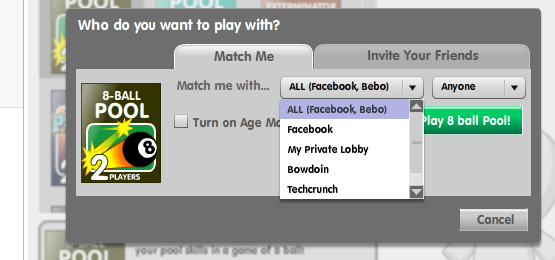With the emergence of cross-social-network developer platforms (first Google’s OpenSocial and then Bebo’s Facebook clone) comes the possibility for applications to connect people across social networks, thereby blurring the lines that designate where one social graph ends and another begins.
Out of the handful of applications on Bebo’s private (and soon-public) platform, one called Bunchball has earned the honor of becoming the first social network application to actually connect users of two social networks (Facebook and Bebo), and synchronously at that.

Bunchball consists of a set of Flash-based games: pool, arcade trivia, chess, sudoku, etc. When you initiate a game, you can choose to be matched with people from any social network that supports Bunchball (currently only Facebook and Bebo, but before long Friendster, Hi5, LinkedIn, MySpace, Ning, Oracle, Orkut, Plaxo, Salesforce.com, and Six Apart as well). You can also opt to just play people from within your current social network (Facebook in my case) or just your college, workplace, region, etc.
I don’t presume that it was very hard for the developers of Bunchball to match users up across social networks once they had established the application on both Facebook and Bebo. Nor do I have any reason to believe that it really made a difference, as far as cross-network interactivity goes, that these two social networks essentially share the same platform. What seems to have mattered most is that numerous social networks have begun to make themselves available to developers, a trend that will accelerate as OpenSocial rolls out more fully in 2008. As this happens, we will see many more applications connect users regardless of their chosen social network, simply because they can run the same applications in several social environments and they have no reason to wall themselves off from each within which they reside.
Furthermore, I wouldn’t be surprised to see this happen in more substantial ways than just matching people up for games. Third-party applications may end up substantially downplaying the importance of each particular social network as they replicate the same functionality across networks. This trend may emerge particularly strongly if the social networks themselves resist opening up their social graphs to other networks while users demand interoperability. Whose to say that profiles and lists themselves may not end up being managed by third-party applications that conform to open standards? It’s not inconceivable, especially if one expects the social networks to continue their rush to please developers by providing them with ever-greater accessibility and tools with which to work.